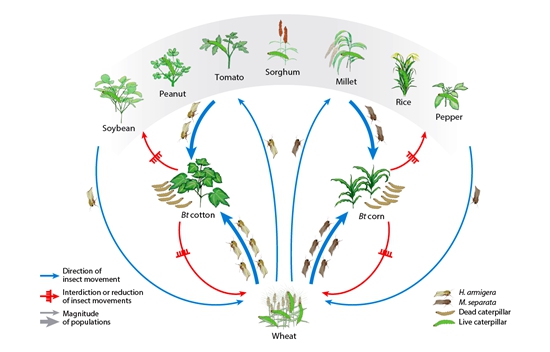A Review of Insect-resistant Genetically Engineered Crops in China: Development, Application, and Prospects for Use
China has more than 20% of the world’s population but less than 7% of the arable land. In addition, rapid urbanization and excessive application of pesticides and fertilizers have led to loss of arable land. Against this background, China’s central government made the strategic decision to develop and apply agricultural biotechnology to increase agricultural productivity and to promote national food security and green agricultural development. With huge financial input, great progress has been made in the development of insect-resistant GE (IRGE) crops, especially cotton, rice, and corn. Recently, researchers from the State Key Laboratory for Biology of Plant Diseases and Insect Pests (IPP-CAAS) published an article entitled “Insect-resistant Genetically Engineered Crops in China: Development, Application, and Prospects for Use” in Annual Review of Entomology. The development and application of IRGE crops in China and the strategies to promote their sustainable use were systematically discussed.
In this article, the authors examined the current status of research and application of IRGE crops in China, analyzed the prospects and challenges, and discussd strategies to promote the development and application of GE crop technology in China. In particular, the experiences of China in management of target pest resistance evolution to Bt cotton and control of non-target insect pests were analyzed in-depth. This analysis should provide valuable lessons in sustainable use of a wide range of Bt crops for other countries, especially for developing countries with agricultural situations similar to China. Moreover, the significance of scientific layout of IRGE crops for controlling major transboundary migratory pests was discussed for the first time. Finally, strategies for accelerating the application of GE crops in China based on the issues discussed in the article, were proposed. These strategies might be suitable for other developing countries as well.

More details are available at the link below:
http://www.annualreviews.org/doi/abs/10.1146/annurev-ento-011019-025039
By Li Yunhe (liyunhe@caas.cn )
-
 Apr 18, 2024Opening Ceremony of the Training Workshop on Wheat Head Scab Resistance Breeding and Pest Control in Africa Held in CAAS
Apr 18, 2024Opening Ceremony of the Training Workshop on Wheat Head Scab Resistance Breeding and Pest Control in Africa Held in CAAS -
 Apr 03, 2024IPPCAAS Co-organized the Training Workshop on Management and Application of Biopesticides in Nepal
Apr 03, 2024IPPCAAS Co-organized the Training Workshop on Management and Application of Biopesticides in Nepal -
 Mar 28, 2024Delegation from the School of Agriculture and Food Science of University College Dublin, Ireland Visit to IAS, CAAS
Mar 28, 2024Delegation from the School of Agriculture and Food Science of University College Dublin, Ireland Visit to IAS, CAAS -
 Mar 25, 2024Director of World Food Prize Foundation visited GSCAAS
Mar 25, 2024Director of World Food Prize Foundation visited GSCAAS -
 Mar 20, 2024Institute of Crop Sciences (ICS) and Syngenta Group Global Seeds Advance Collaborative Research in the Seed Industry
Mar 20, 2024Institute of Crop Sciences (ICS) and Syngenta Group Global Seeds Advance Collaborative Research in the Seed Industry
